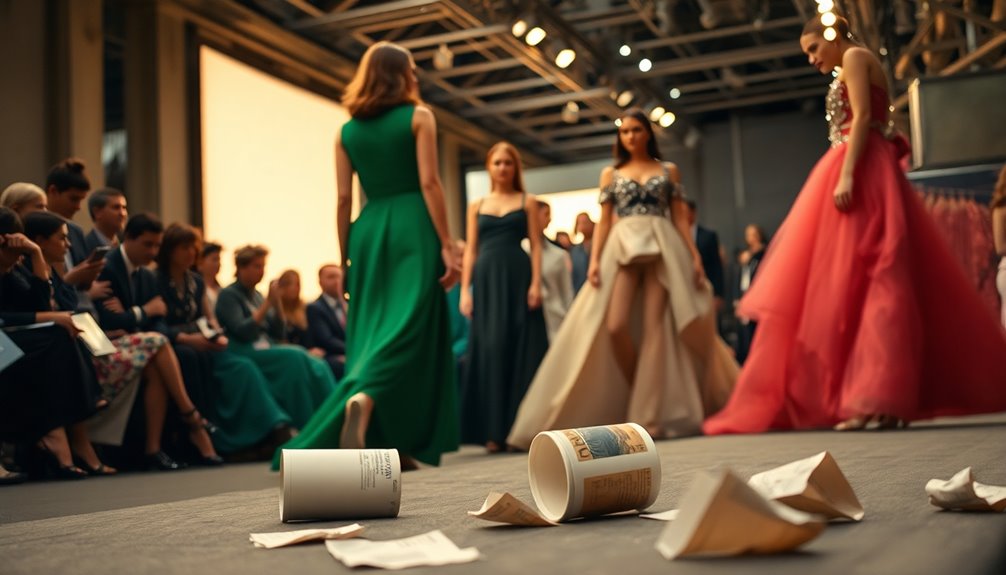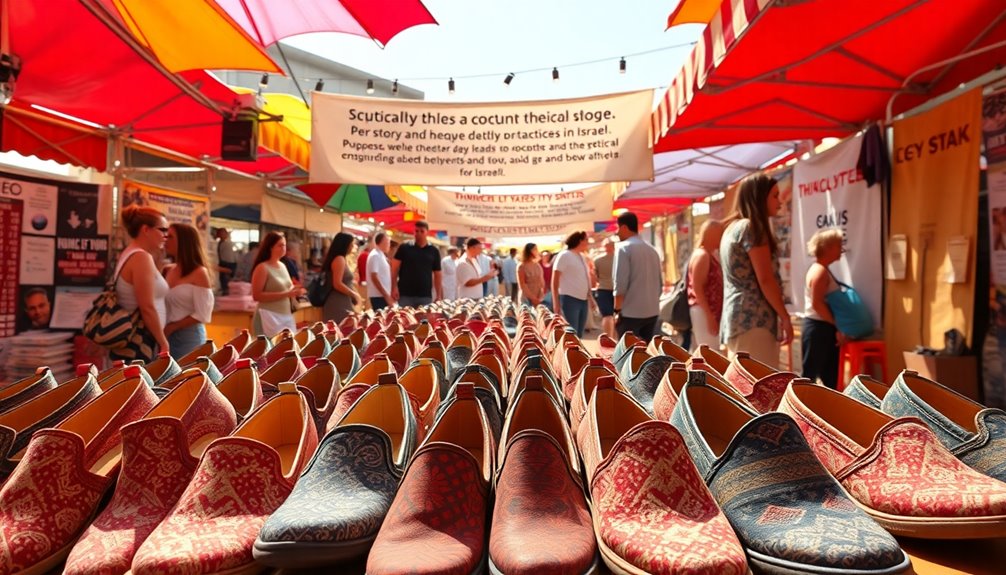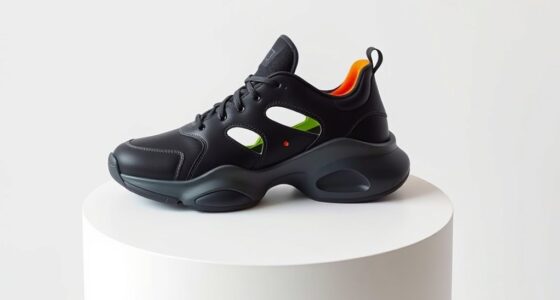Unmasking Paris Fashion Week reveals hidden costs that go beyond the showcase of high fashion. Each season, the event emits a staggering 241,000 tonnes of CO2, largely from air travel and hotel stays. On the ethical front, many workers, mostly young women, face unsafe conditions and wage theft. While brands may promote eco-friendly practices, greenwashing often obscures true sustainability efforts. Despite generating 1.2 billion euros for the Paris economy, this event masks a significant environmental and social impact. Want to discover how these issues shape the future of fashion and influence your choices? Keep exploring the topic!
Key Takeaways
- Paris Fashion Week emits 241,000 tonnes of CO2 each season, comparable to lighting Times Square for 58 years.
- Air travel and hotel stays for attendees contribute 225,000 tonnes of CO2 emissions annually.
- Labor exploitation, particularly among young women, includes wage theft and unsafe working conditions due to weak regulations.
- Many brands engage in greenwashing, misrepresenting their sustainability efforts while continuing fast fashion practices.
- The event generates 1.2 billion euros, creating economic benefits for Paris, but at significant environmental and social costs.
Environmental Emissions Overview
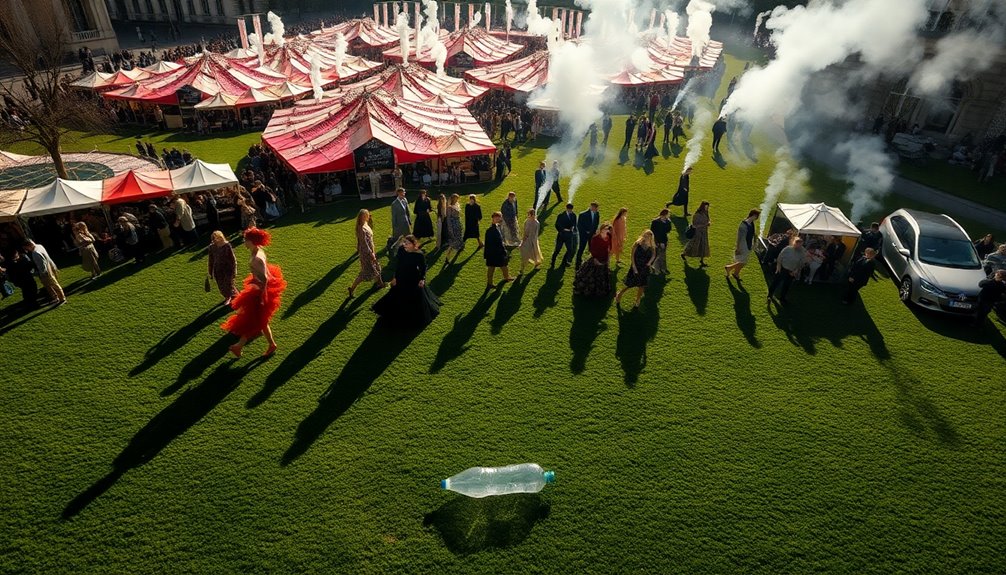
Paris Fashion Week consistently generates staggering environmental emissions that have significant implications for climate change.
You might be surprised to learn that this event emits approximately 241,000 tonnes of CO2 each season. A large portion of this comes from air travel, where attendees alone contribute around 147,000 tonnes of CO2 annually, often flying business class.
When you add hotel stays, the emissions jump to about 78,000 tonnes. The combined impact of these activities equals lighting Times Square for an astonishing 58 years!
It's vital to recognize that the textile sector, including events like this, contributes 3 to 10% of global carbon emissions, making Paris Fashion Week a major polluter in the fashion industry.
Labor Exploitation Issues

Many people may not realize the extent of labor exploitation within the fashion industry, especially during high-profile events like Fashion Week.
Workers, mainly women aged 18-35, often face unsafe conditions and wage theft while producing garments for major brands. Many of these workers toil in factories or cotton fields, enduring long hours for meager pay.
Weak enforcement of labor regulations means that vulnerable workers are easily exploited, with little recourse for their rights.
Additionally, opaque supply chains make it difficult for consumers to recognize these human rights abuses.
As you admire the latest fashion trends, remember the hidden cost of human labor behind them, and consider advocating for fair labor practices in the industry.
Greenwashing vs. Sustainability
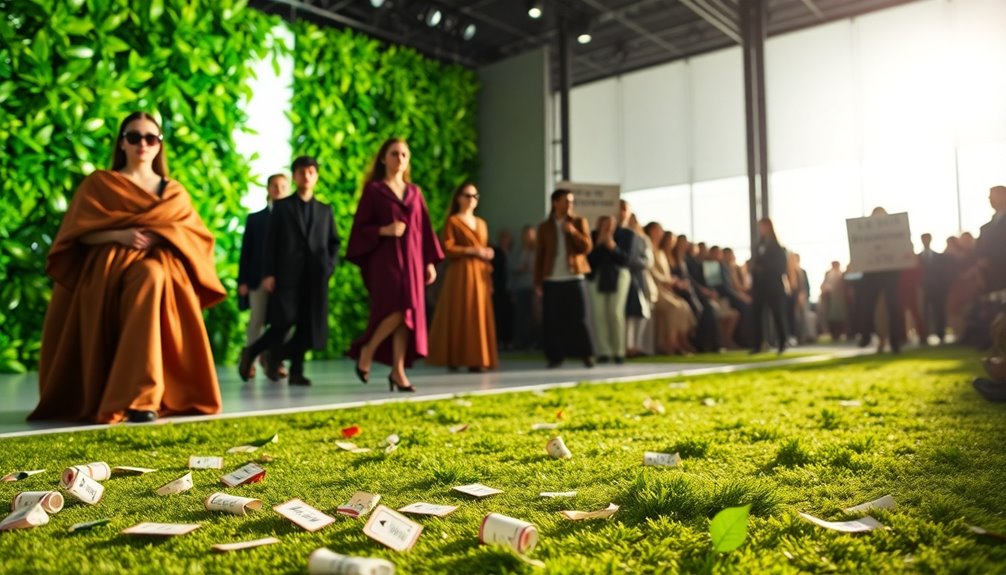
While the fashion industry grapples with labor exploitation, it's also facing scrutiny over its sustainability claims. You might notice brands touting eco-friendly initiatives, but many of these efforts are merely greenwashing. It's vital to differentiate genuine sustainability from marketing tactics designed to deceive.
- Many brands use recycled materials, but do they make a real impact?
- Eco-friendly production techniques are often limited in scope.
- Circular fashion promotes recycling, yet many still rely on fast fashion models.
- Green collections rarely achieve significant reductions in emissions.
- Transparency in supply chains is still lacking, making it hard to hold brands accountable.
As you navigate this landscape, stay informed and support brands that truly commit to sustainable practices. Additionally, the fashion sector can draw inspiration from renewable energy sources like heat pumps to reduce its overall carbon footprint.
Economic Benefits for Paris

As the world's fashion capital, Paris enjoys significant economic benefits from events like Fashion Week, which brought in an estimated 1.2 billion euros in 2022 alone.
You can see this impact in the bustling hotels, restaurants, and shops that thrive during the event. International visitors flood the city, booking accommodations and dining out, which boosts local economies.
The surge in demand creates job opportunities in hospitality, retail, and event management. Additionally, the Fédération de la Haute Couture et de la Mode oversees over 100 shows each season, generating further revenue.
This annual spectacle not only showcases creativity but also cements Paris's status as a global fashion hub, ensuring ongoing financial benefits for the city and its residents.
Community Impact of Fashion Week
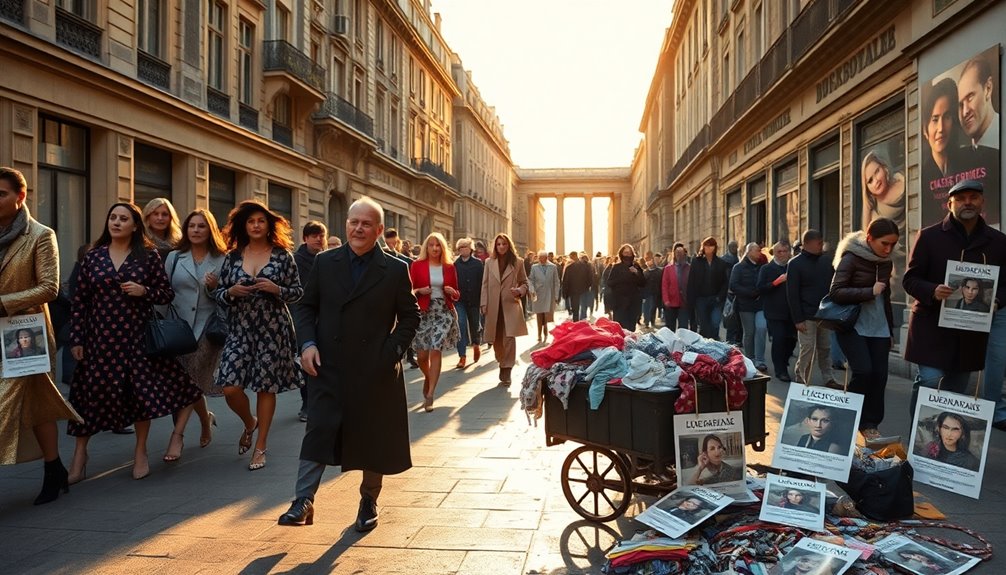
Fashion Week transforms local communities in Paris, creating a vibrant atmosphere that resonates beyond the runway.
As you stroll through the city, you'll notice the buzz of excitement and opportunity. Local businesses thrive, and the cultural scene flourishes as the world's attention turns to Paris.
Here are some ways the community feels the impact:
- Restaurants see increased foot traffic and bookings.
- Shops experience a surge in sales from fashion enthusiasts.
- Street vendors benefit from heightened tourist activity.
- Cultural events and exhibitions enjoy greater visibility.
- Job opportunities blossom in hospitality and event management.
While the glamour of Fashion Week captivates, its ripple effects on local life showcase the interconnectedness of fashion and community. Additionally, the event encourages local artisans to showcase their talents, contributing to the cultural scene and enhancing the overall experience for visitors.
Future of Fashion Sustainability

The future of fashion sustainability looks promising, with many designers embracing eco-friendly practices and innovative materials.
You'll notice an increasing focus on recycled materials, like polyester from bottles and organic fibers. More brands are repurposing deadstock fabrics, which helps minimize waste.
Circular fashion initiatives are on the rise, encouraging you to shop second-hand and recycle garments. As consumer demand for transparency grows, brands are collaborating with sustainability organizations to improve their practices.
However, be cautious of greenwashing; some brands may claim to be sustainable without making real changes.
Ultimately, the push for sustainability in fashion is gaining traction, and your choices as a consumer can greatly influence this positive shift.
Embrace eco-conscious brands and support the movement towards a greener industry.
Technological Innovations in Fashion
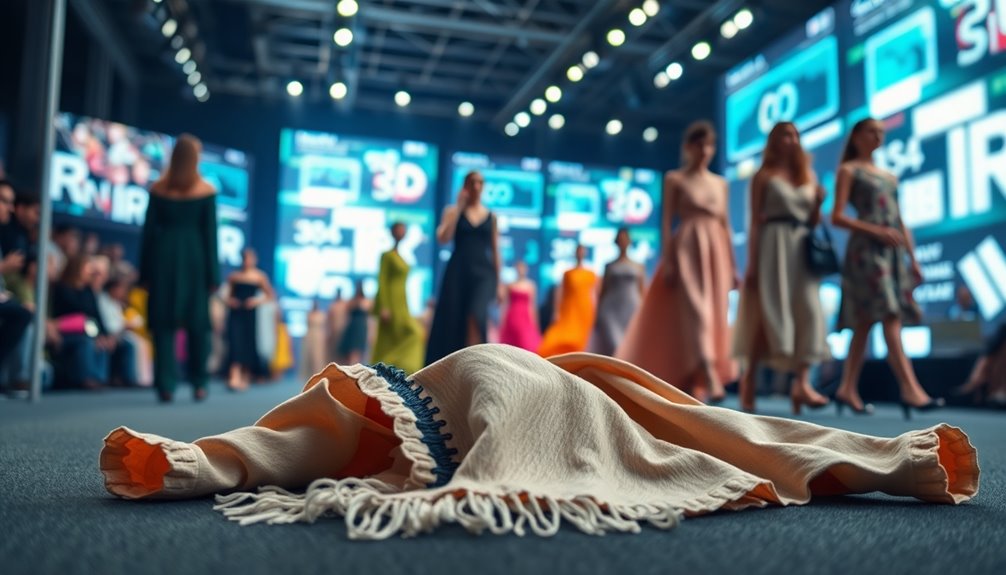
Numerous technological innovations are reshaping the fashion landscape, making it more efficient and sustainable.
You'll notice how these advancements not only enhance creativity but also address environmental concerns. From virtual fashion shows to AI-driven design, the industry is evolving rapidly. In today's world, astrological compatibility may also influence consumer choices and brand loyalty. The rise of sustainable materials is particularly important, as these innovations support eco-friendly practices in production. Additionally, the incorporation of smart contracts can streamline transactions and ensure authenticity in digital fashion assets. Moreover, the fashion industry can contribute to reducing deforestation through sustainable sourcing of materials.
Here are some key innovations to watch:
- Digital platforms for virtual fashion showcases, reducing travel emissions.
- AI and data analytics to predict trends and manage inventory efficiently.
- Blockchain technology for improved supply chain transparency and traceability.
- Augmented reality experiences to engage consumers in new ways.
- Sustainable materials and production methods that minimize waste and resource consumption.
Additionally, the integration of enhanced natural language processing allows brands to better understand consumer preferences and improve communication.
These developments are paving the way for a more responsible and innovative fashion future, aligning with consumer demands for sustainability.
Frequently Asked Questions
How Do Fashion Weeks Affect Local Wildlife and Ecosystems?
Fashion weeks can have a significant impact on local wildlife and ecosystems.
When large events take place, traffic increases, leading to habitat disruption and pollution. The demand for resources can strain local ecosystems, while waste generated by attendees can contaminate natural areas.
You mightn't realize that the extravagant setups and materials used often lead to long-lasting environmental consequences, affecting biodiversity and the health of surrounding habitats.
Awareness is essential for mitigating these effects.
What Role Do Influencers Play in Promoting Sustainable Fashion?
When it comes to promoting sustainable fashion, influencers can really be the tip of the iceberg. They wield significant power to shape consumer behavior and raise awareness about eco-friendly practices.
By showcasing sustainable brands and sharing their personal experiences, you can inspire your followers to make conscious choices. Their reach amplifies important messages about sustainability, pushing the fashion industry towards greener practices.
Ultimately, your support can help foster a more responsible fashion culture.
Are There Efforts to Include Diverse Body Types in Fashion Shows?
Yes, there're growing efforts to include diverse body types in fashion shows.
Designers and brands are increasingly recognizing the importance of representation. You might notice more models of varying sizes on the runway, reflecting the reality of customers.
This shift not only challenges traditional beauty standards but also promotes body positivity.
How Does Paris Fashion Week Address Cultural Appropriation Concerns?
Paris Fashion Week's approach to cultural appropriation involves increasing awareness and sensitivity among designers.
You'll notice more discussions around representation and inclusivity, as brands seek to honor diverse cultures authentically.
Some designers collaborate with cultural consultants to guarantee respectful representation, while others spotlight traditional artisans.
However, it's crucial to remain vigilant, as not all brands genuinely commit to these practices, and discussions around appropriation continue to evolve within the industry.
What Are the Long-Term Effects of Fast Fashion on Consumer Behavior?
Fast fashion's long-term effects on your behavior include a tendency to prioritize trends over sustainability, leading to impulsive purchases.
You might find yourself buying lower-quality items that quickly wear out, fostering a cycle of consumption. This can desensitize you to the value of craftsmanship and ethical production.
Over time, you may also feel guilt about your environmental impact, prompting a shift towards more conscious shopping habits as awareness grows about fashion's consequences.
Conclusion
As you navigate the glitzy façade of Paris Fashion Week, remember it's not just a parade of beauty—it's a stage for hidden costs that cast long shadows. The allure of high fashion often comes at a steep price, from environmental damage to labor exploitation. By choosing to support brands that genuinely prioritize sustainability, you can help turn the tide toward a more ethical industry. Let your voice echo in the halls of fashion, demanding change that resonates far beyond the runway.
